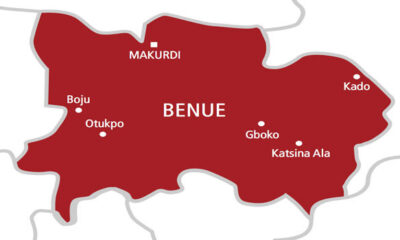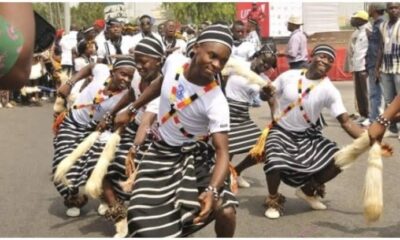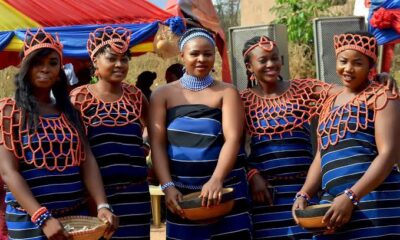Special Features
From farming to crafts: Amazing insights about TIV tribe in Nigeria
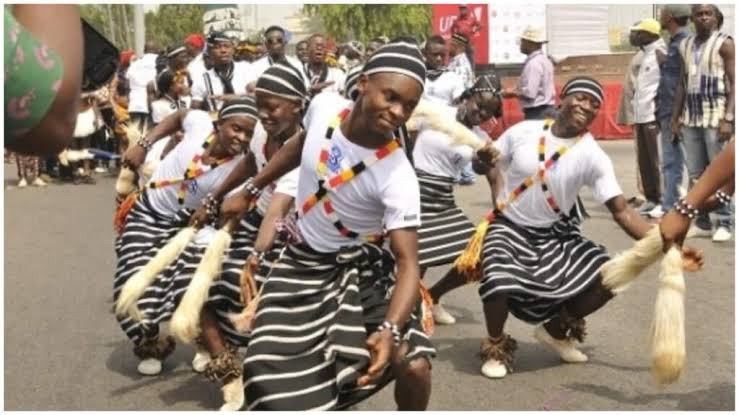
In this article, News360 Nigeria delves into fascinating aspects of the Tiv ethnic group in Benue State.
The Tiv or Tivoid people are a group of ethnic people who are indigenous to the Benue and Plateau State of Nigeria, with smaller populations found in other neighboring West African countries such as Cameroon and Ghana.
They speak the Nyanza language, which is exclusive to the indigenous people.
The majority of the Tiv people are farmers and cattle herders, and they reside in groups in huts and villages.
Compared to the Hausa and Fulani, the Tiv are darker, shorter, and stockier, true Negros. They are also thought to be lovers of women and food.
They are the fourth largest ethnic group in Nigeria, numbering over seven million, who are dispersed throughout the country and Cameroon.
History
The history of the Tiv people is extensive and dates back to the fourth century AD.
The Tiv people believe that their ancestors came from a region around the Nile and moved to their current location in the east.
They are thought to have migrated to the plains due to population pressure from their home at a Swem in the Obudu hills.
Along with the Fulani, it is thought that the Tivs were temporarily protected during their migration and were forced to depart when they refused to marry off their daughters.
In order to maintain their unique identity, the Tiv people carved tribal symbols onto the skin of their faces for the men and their bellies for the women.
Location
The majority of Nigeria’s Tiv speakers are located in the middle belt, which includes the states of Taraba, Plateau, and Benue.
They live in the Guinea Savannah vegetation, which is divided by the Katsina Ala and River Benue.
The Tiv people are estimated to number close to 8 million as of 2021.
Language
The Tiv language belongs to the upper Benue Bantu group or Plateau branch of the Bantoid branch of the African languages found in the Niger Congo subfamily.
There are roughly 15 million Tiv speakers in Nigeria, and a small number also speak the language in Cameroon.
Their language is spoken in Benue, Taraba, Nasarawa, Plateau, Cross River, and Federal Capital Territory (FCT) Abuja.
Occupation
The Tiv are a happy and gifted people who do not fear misfortunes or their enemies.
Their primary crops are yams, millet, and sorghum; they are mostly subsistence farmers who use their harvests to make porridge or to enhance the flavor of other dishes like stews and sauces.
Cattle are kept in small numbers due to the tsetse fly, despite the abundance of goats and chickens.
The Tiv consider themselves to be the world’s greatest farmers. Their economy is based on yam farming, so they are very conscious of how their farms appear to outsiders.
Social Group
In West Africa, the Tiv people are the most well-known example of a segmentary lineage society.
This segmented lineage system, which makes each lineage and individual unique, discourages the concentration of power on any one individual or group.
Every Tiv considers themselves to be a part of Ipusu (descendants of son Pusu) or Ichongo (descendants of son Chongo).
Both Ichongo and Ipusu are split into multiple main branches, each of which is further subdivided into smaller branches. The ipaven is the smallest branch, or minimal lineage.
Although segmentary lineages are found all over the world, African societies are the ones that are most well-known for having them.
With their society structured around a system of clans and kinship groups, the Tiv people place a high value on their cultural traditions.
The Ijir Tamen ritual is a special rite of passage ceremony to mark the passage from childhood to adulthood, is one of the most prominent Tiv cultural practices.
Beliefs and cultures
The Tiv people have a unique cultural identity and are well-known for their expert pottery-making and agricultural methods.
Ancestor worship is highly valued in their traditional religion. They also have a strong oral tradition, and narrative is very important to them.
Owing to westernization, a small percentage of Tivs are now Muslims and Christians, but their traditional religion, which is centered on the control of forces (akombo) that a creator god has given humans remains fundamental.
The akombo can be seen in specific emblems or symbols as well as in the illnesses they cause.
A gathering of elders with the power to control these energies takes place at night in order to address akombo’s manifestations that impact the group, such as epidemics.
The Tivs are also extremely pragmatic individuals who prefer to test everything they are told before accepting it.
A few remarkable aspects of Tiv culture are their cuisine, attire, and marriage customs.
Tiv Cuisine
It is been said that when it comes to food, the average Tiv person does not joke.
The majority of Tiv cuisine is solid, cooked, mashed, or made with hot water.
They are primarily made of carbohydrates or byproducts from corn, beans, cassava, cocoa-yam, yams, etc.
The Tiv people grow sesame seeds, also known as “Beni seeds,” which are both a valuable food source and a cash crop.
Along with their unique soups and snacks, some typical Tiv dishes include ruam kumen (pounded yam), ruam nahan (turned food), akuto (sweet potato pottage), choko (dafa), akpukpa, etc.
Tiv Dressing
The Tivs are outstanding weavers who have perfected their craft through generation after generation.
Because traditional clothing carries a strong sense of cultural identity, Tiv people prefer it to other forms of clothing.
The A’nger outfit is the most well-known example of traditional Tiv clothing. It is composed of woven black and white stripes that create a lovely pattern.
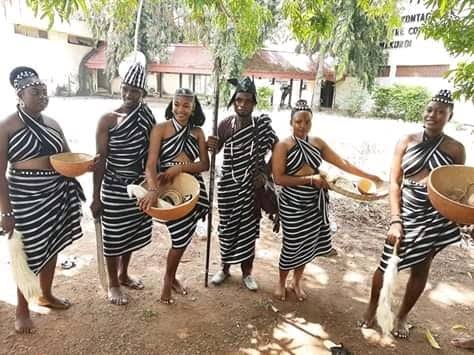
The combination of black and white, which represent their African heritage and peace and love respectively, highlights the distinctiveness of Tiv culture.
While the men wear a Kpaabor bag and a sort of turban wrapper, the Tiv women wrap this fabric around their waists and reach their knees.
Tugudu is another fabric that is only used for interring the deceased. The Tivi women enjoy dressing in Ivvavtyo, a traditional garment worn on special occasions.
The Tiv people also use fabrics from Lishi, Gbev-whaa, Godo, Gurugu, Chado, Deremen, and Gbagir. Their economy has benefited from the large number of customers that Tiv fabric receives.
Marriage
The Tiv culture recognizes four types of marriages:
Exchange marriage, or yamshe, is a type of marriage in which spouses share their children as wives and husbands.
A person without a sister or close relative would continue to be single for the duration of the deficiency.
The sons entrusted with the daughters are known as “guardians,” and the daughters who are shàred are known as “aggol.”
Prior to the introduction of bride prices during the colonial era, girls were being taken as slaves and married off to their husbands through marriage by purchase, also known as Kem marriage.
This practice was considered more honorable at the time.
The Tiv people now practice bride price marriages, which ended the practice of men delaying marriage until later in life.
Money also plays a role in the marriage process because the colonial masters required men to pay a bride price before they could take a girl as a wife.
Another name for marriage by capture is kwase-nghol.
This happened because the exchange marriage was insufficient; it entails ambushing the desired girl and then eloping to a new location with her.
During the Tiv migration, this type of marriage was popular and frequently resulted in intercommunal conflicts.
Sister marriage; this involves a young man making payments to remove the shell(symbolizing sexual inaccessibility) of the unmarried girl whom he is attracted .
The man is granted access to the girl for sexual relations if the girl’s mother accepts the gift; however, if the girl marries another man, the marriage ends.
Music
The Tiv people’s culture includes music, much like any other African culture.
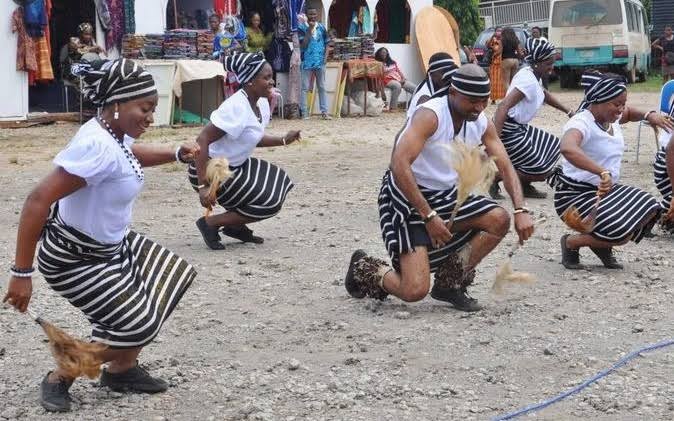
A group of Tiv dancers
They have developed a method of communication via music. Among the instruments used in traditional music are;
Kakaki: A royal trumpet that the king uses to communicate important messages to the populace.
Ilyu: Elders are gathered for a meeting with the King using this instrument, which is constructed of light wooden material. It is also employed for community announcements of deaths.
Indiana: This unique musical instrument is fashioned from a mahogany trunk. It is used to inform people about festivals, like the Yam Festival, to take place during that time. It is also used to declare a successful harvest year to be underway.
Gbande: During festivals, young men from the community play this large musical instrument.
When played, the gbande creates powerful rhythms, and its beats communicate messages to the public. It is important on occasions like the King’s coronation and death.
Adiguve: The Tiv people use this instrument, which is similar to the violin, as one of their favorite musical instruments.
The Adiguve is played to everyone’s admiration during the festival. Additionally, it serves as a symbol when a community elder passes away.
Despite the growing influence of western media, the Tiv people of Benue state continue to use parts of this traditional communication system, such as the Kakaki, Agbande, Indyer, Adiguve, and Ilyu, to convey messages to their people.
It is also important to observe how the Tiv conduct their funeral rites;
Because it is ingrained in their regional customs, they place a great deal of importance on the burial of their loved ones.
The deceased are typically buried without a casket and within a day. An old woman washes the body, and it is wrapped in A’nger, Tugudu, or Gbagir clothing before being buried. Until then, their ancestors are receiving messages telling them to wait for the dead to enter the afterlife.
Political structure
The Tivs are a bold, courageous, fearless, independent people who do not respect princes or bow to cultural authority.
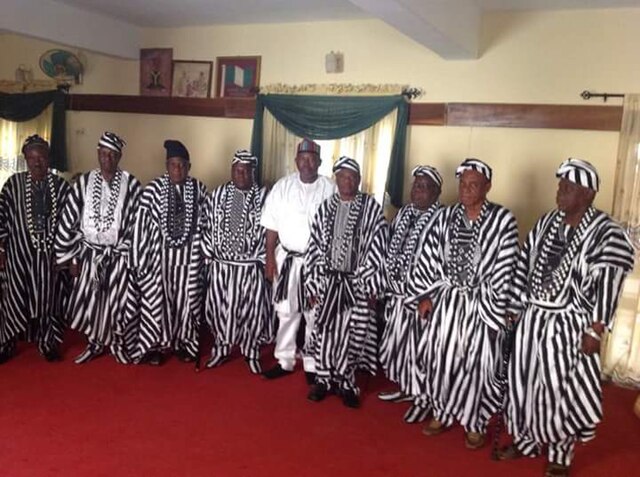
A group of Tiv elders
They do not have chiefs or councils, nor do they have any administrative divisions.
The criteria for leadership were wealth, age, and influence. The leaders’ duties included establishing a code of conduct for their people, mediating conflicts within their lineages, serving on moots, and guiding them in all internal and external matters.


